R. Lee Smith's Blog, page 25
November 19, 2013
T is for Tropes
T is for Tropes
She found herself keenly wishing she had a weapon in her hands. She could go back into her room and get the table lamp, but that was about it, and that only thing it was likely to break if she hit someone with it was itself. If this were the movies, she’d have a halberd collection or something mounted helpfully in the hallway, or she’d be a ninja who knew how to kill a man with a hard-boiled egg. God damn the movies! —Heat
* * *
In the movies, this would be young Olivia’s cue to devise some sort of daring escape, probably killing her captor in the process, although he would keeping popping up sporadically like some demonic Billy Bop’em doll, until she finally, what? Dropped a giant satellite dish on him? Shot a rusty cannon at him? And then she would stand triumphant on the side of the mountain with the wind in her hair and utter some unbelievably bad-tasting joke (“He had to catch a call,” in the case of the dropping satellite dish, and maybe that old tried-and-true, “He’s fired,” in the event that she went along with the cannon). Ideally, she should also have a good-looking guy under her arm, but in any case, she would definitely have all the other captive women in some state of undress scrambling for their freedom down the mountainside before her as the music swelled and the end credits began to roll.
This was not the movies. –Olivia
* * *
We all know what a trope is, even if we’re not all familiar with the word. It’s a plot device, an overused storytelling element, a cliché. I’ve touched on tropes in these posts before—most notably as Aliens Who Don’t Wear Clothes, Aliens Who Speak Perfect English and just Aliens—so before I go much further into this article, I’d like to go on record and say that I don’t think all tropes should be avoided. I’m not even sure they can be avoided.
In my extremely unprofessional opinion, good storytelling doesn’t have to begin with an original idea. How many truly original ideas could possibly be left out there anyway? Good storytelling is taking an old theme and putting a unique twist on it, recreating rather than recycling ideas. All of my books can be adequately summed up by ‘Boy Meets Girl’ were it not for the fact that the boy in each case is a demon or a minotaur or an alien bug. I use a lot of tropes when I write, although I’m rarely conscious of them until the editing phase. And I don’t always take them out when I discover them. There’s a time and a place for certain tropes, or as my mother used to say, clichés are clichés for a reason. Sometimes, a damsel will need to be in distress and that’s okay. Flailing about or fainting as her only way of dealing with it, however, is not okay.
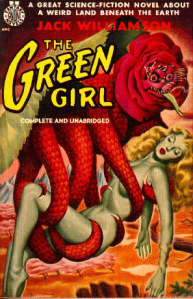
I’ve seen enough hentai to know where this is going and I’d want to be awake for it, personally.
So there are good clichés and bad clichés and sometimes the only difference lies in how the subject was handled. Having said that, there are a few tropes that I would be happy to see die in a fire and because this is my blog, I’m going to share them with you. We’ll call it R Lee Smith’s Top Ten Lists of Tropes that Piss Me Off. Catchy, ain’t it?
10. You’re taking this way too well. I see this more often in action or horror genres, but it does pop up in romance now and then, especially paranormal romance. Say you want to write a love story between a lady and a werewolf. The object is to get the two of them in bed, so neither one can flip out too much about the other, so instead there’s either a token, “Whoa, werewolf,” moment or no reaction at all. Same goes for the heroes who take alien invasions, zombie apocalypses and ninja attacks completely in stride. I saw a motorcyclist wipe out in front of me once. I didn’t panic and I like to think I handled myself well, but I’d be lying if I said my adrenaline wasn’t up and all I did was hold a towel on a guy and call 911. If your character is a soldier or a demonologist or a high school teacher and therefore accustomed to staring death and weirdness in the face on a daily basis, that’s one thing, but most of the stories that follow this trope make a point of having the hero/ine be as vanilla as they come and just caught up in events beyond his/her control.
9. The mindless monster. This is what’s wrong with most of the horror books and movies you will ever read or see. In an attempt to really sell the scarability of the creature, the writer sets it on a motiveless, unstoppable rampage. The bog monster who has managed to hide from human eyes for a hundred years suddenly commits itself to killing all eight of the promiscuous teens who have blundered into its bog, teens who would have blundered back out again in an day or two if it had just waited them out. The T-Rex who has just successfully taken down a gallamimus drops a guaranteed meal to chase after some snack-sized humans. The two-headed hellhound that eats, at my rough estimate, three times its weight in panicky people over the course of a single slaughter-filled night. Zombies can get away with relentless killing, as can hive-minded aliens, vengeful revenants, pretty much anything that has a plausible reason to want to kill everything it sees. It’s the monsters who don’t have a reason and do it anyway that honk me off. Look, animals hunt for very basic reasons and when those needs are met, they stop. Even sharks don’t eat and eat and eat and eat. As for monsters (or the humanity-challenged, as they prefer to be called), if they’re thinking, reasoning creatures, they need to be written that way and not just kill everything that moves because their Saturday is open.
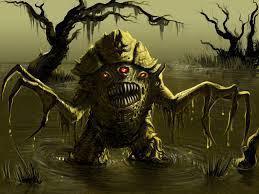
Although admittedly, there’s not a lot to do in a swamp.
8. It’s over, moving on. This happens in all media formats and all genres, but I’m watching a horror movie right now, so that’s what I’m going to use as an example. The mindless monster has just been horribly killed, for real this time, and the sole survivors—the hot hero and hotter heroine—are gasping for breath over its mangled and perhaps charred corpse. They have seen their closest friends killed and mutilated. They have had to do some killing and mutilating themselves. They ought to be traumatized halfway to a coma, but instead, the guy cracks a joke, the girl laughs and they start to make out, ankle-deep in monster innards. Hey, I like a happily-ever-after as much as the next person and I realize most readers expect one from a romance, but if the heroes don’t feel they need to be emotionally involved in the story, why the heck should I? A monster-rampage is not something you brush off with a pun and a kiss, and I don’t care how good the kiss is (or how bad the pun is). When you dismiss the ordeal your characters have had to come through, you are dismissing your own book.
7. The 200 page misunderstanding. I have completely lost my patience with this one. When I see it in a book, I snap that sucker closed and trade it in. When I see it in a movie, I walk out. There is precious little so insulting to a reader/watcher/whatever’s intelligence as the 200 page misunderstanding. Misunderstandings happen and I realize that it isn’t always easy to start talking it out, especially if one of the affected parties was being deceitful in some fashion to begin with, as is ridiculously often the case. I get it. I do. But for God’s sake, if you can clear up the whole thing just by shouting, “He was my brother! I can hug my brother, you jealous dick!” just do it. No misunderstanding should last more than a few chapters unless you’re playing it deliberately for laughs.
6. The laughing villain. As a young nerd, I not only played tabletop role-playing games, I invented one. (As a harbinger of written things to come, my sourcebook is over 2000 pages long.) However, I never played Dungeons and Dragons, though, because of their total lack of realism. Never use a gelatinous cube to kill a paladin when physics will do, I always say, but I digress. Although I never played D&D, I was thrilled when the movie came out because a) I love bad movies, b) I love movies with dragons in them and c) I love Jeremy Irons, who played the evil villain. I had so much hope. Right up until his introductory scene when he came cackling down the stairs with outflung arms and stood laughing into the camera for several sustained seconds. Oy. Look, I have humorous thoughts now and then. I have been known to let out a titter that I’m sure seemed completely random and perhaps a bit unnerving to those around me. But never in my life have I bwa-hahaha-haaaed my way through my own house because I was just that tickled by my own evil genius. You can’t take a cackling villain seriously. You just can’t. And without a plausible villain, there simply is no tension. Villains can laugh, of course. Heath Ledger’s Joker had a terrifying sense of humor, but when he laughed, you knew it was because he found something genuinely funny, which meant very bad things were about to happen. So let your villain laugh…just make sure there’s actually something to laugh about, otherwise you get a villain who is…
5. Evil…but not too evil. Everyone has different thresholds for how bad the bad guy ought to be, and certainly not everyone believes severed heads and ripped bodices belong in a romance, but I’m one of those who thinks the Big Evil ought to be, well, evil. Not rude, not mean, evil. No, he doesn’t have to drink children’s tears or read the Necronomicon by the light of a crackling puppy-fire, but neither does he seduce the heroine when he can just order his minions to have her bathed and brought to his chambers. Look, I’m not a complete sociopath (despite all evidence to the contrary). I don’t want bad things to happen to my heroes. But as a writer, I have to want what all my characters want and that includes the villain, which means that when he has his enemy in his power, he should not hesitate to torture, ravish or kill if that is what he wants to do. If I pull his punches because I don’t want my heroes to get hurt, not only does he fail, but I fail.
4. Accelerated growth. There are a few things I would like to get off my chest and this seems like a good time. I believe in mothman. I believe in ghosts. I believe there could be dimensional rifts of a sort that could allow other beings access to our world. I believe in the supernatural, the paranormal, the unhuman. But I do not and can not believe in accelerated growth. That is unsupportable, undefendable and just plain stupid. Mass does not come from nothing. If you let a tentacle nightmare out of a jar, it does not grow to be ten stories tall without consuming matter to the equivalent of a ten-story building (and even if it did, it still couldn’t do it overnight without splitting its over-stretched skin or bursting into flames from the heat of its over-active digestive system). The overnight clone, the overnight pregnancy, the overnight anything—all crap. And while in most cases I like to cover my self-published ass by saying that a good writer can make even a bad trope work in the right circumstances, no, not in this case. Accelerated growth is always wrong. Never do it.
3. Inappropriate levels of competence. This is nothing but accelerated growth on an intellectual rather than a physical level. Let me just say that a hero is supposed to know what he’s doing and if it’s been established that he has a certain set of special skills, I’ve got no beef with him using them. What annoys me is when a hero becomes an instant expert in a field that ought to take years of study and training, like the princess who has spent virtually her whole life locked in a tower, yet two weeks later is slaughter-stabbing her way through an army of demonic knights.
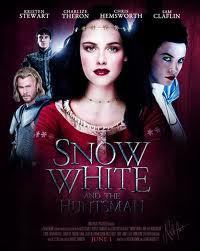
Granted, that was not the worst aspect of the movie.
2. Heroes who flip off demons. This is a staple of movies wherein the hero is supposed to be cool, so ball-bustingly over-the-top stupid-supercool that dry sarcasm and sunglasses make up 90% of his screentime. And in the movies, special effects and Vin Diesel’s rippling abs can even pull it off, but in a book, this attitude falls flat for me every time. When reading a book, I have to do two things: I have to believe the Big Evil is a threat and I have to believe the hero takes that threat seriously. Having your hero taunt the Big Evil can work as an act of defiance or heroic sacrifice, but if it’s just the latest in a string of apathetic one-liners, it’s not only not superbad and cool, it’s predictable and boring. And as if that wasn’t bad enough, it also leads directly to my Number One Trope that Pisses Me Off…
1. Demons who let heroes flip them off. So you’ve written the greatest paranormal romance ever. It has everything: a sexily deadly supernatural hero, a sexily sarcastic modern heroine and the biggest and most evil Big Evil that could possibly be imagined…sort of a cross between Lord Voldemort, the big-horned dude from Legend and Cthulu. Your hero and heroine have survived several sexily sinister assaults and now they have their first face to face encounter. Big Evil strides out from his throne of bones. Your hero strides forward to meet him. Your heroine watches, sexily. Perhaps her perky breasts are heaving, I don’t know, it’s your book. Big Evil does the traditional, “Turn aside, mortal, or die. You cannot hope to defeat me,” and your hero replies (sexily), “Fuck you.” Then tells a few yo-momma jokes. And maybe moons him. And your book goes flying across my living room directly into the fireplace because having the most powerful dark wizard/demon/old god take it like a bitch instead of smiting him into a fine red mist just takes my cheese. And oh my God, replace the hero in that scenario with a cocky little kid and it takes all the cheese.

Taken from us all by The Mummy Returns


November 18, 2013
S is for Science
S is for Science
Amy rolled her eyes. “Honey, who are you talking to? Little invertebrate insects on gossamer wings are hell and away from a humanoid species weighing an average of just under two hundred pounds, flapping effortlessly through the sky with a wingspan of approximately ten feet. That is complete bullshit. When you factor in that nobody’s ever seen these things despite the fact that they were living less than fifty miles from a good-sized town, and the fact that they are fully sexually compatible with humans, you have a mind-fuck of galactic proportions.”
Olivia opened her mouth to argue, to say what she had no idea, but to argue anyway because that…that just made too much scary sense.
“Don’t,” Amy said. “Do not. Seriously.”
“But just because we don’t know the physics of—”
“Even without factoring in the enormous density of gullan muscle and bone, you’d need wings more than thirty feet long even to glide effectively, let alone fly. But wingspan is not the biggest issue, baby. Let’s talk about how they just happened to grow wings and arms. Or how, attached where they are, off the shoulderblades, their bodies ought to be dangling down like a kitten in its mother’s mouth. To balance a body like that, they’d need a braincase full of friggin’ plutonium and a breastbone that stuck out about four feet. I’m not even going to mention that whole bit where they can drive their claws into solid rock because that’s just too silly. There is no way,” Amy said, very clearly and firmly, “to explain these people without using the word ‘magic’. And magic, real magic, is just not something that everyone can deal with.” – Olivia
* * *
My mother was a huge nerd, and I mean that in the most loving way. Like a lot of nerds, she read voraciously and our house was always full of books. On her shelves are dozens of legendary names—Zelanzy, Ellison, Heinlein, Asimov. When these men said an alien’s blood was orange, it was because it was iridium- rather than iron-based and by God, you were going to read several pages about their incredibly complex respiratory systems. They wrote books where science moved the story, often was the story, and there was a message and a lesson behind all of it.
I don’t write like that. Frankly, I kind of resent being told that I should. (It’s worth noting here that no one is ever going to refer to me as a legendary writer, either. There may be a connection…) I don’t want to think about what cosmic rays and G-forces would do to the people on my starships, I just want them to fly the damn things. On the hardness scale of sci-fi, I am right around tapioca pudding. Is that a bad thing? Does every character in my book have to be an astrophysics major in order to justify flying a starship? I say no. After all, I don’t know how my car works. I know gasoline makes it go and a snapped fan belt makes it stop. All the fiddly little steps in-between, I take entirely on faith and I don’t see why my characters can’t do the same.
However, at the other end of the spectrum are writers of what, on that fabled hardness scale, would be cotton candy. As in, breathe on it and it melts. Here, we find flying creatures the size of aircraft carriers on an otherwise Earthlike planet that carry around not only hundreds of people, but whole cities. Here we have shapeshifters who can change not only their size at will, but also their weight and density. Here are folks who can regenerate whole limbs without having to first absorb extra proteins or minerals, and certainly without leeching it out of the rest of their body. It happens because it happens, because it looks cool, because just because.

Science!
Don’t get me wrong, soft sci-fi and sci-fantasy have turned out wonderful stories and I much prefer them to the diamond-hard science-fiction of Arthur C. Clarke or Ben Bova. However, I do want the worlds I create to feel like they belong somewhere in the universe. I want readers to think of my gullan, my Arkes, my dumaqs as if they were real people. I want that real-world feeling in every page and that can be hard to capture in a fantasy setting without a token nod toward reality. You don’t need a complicated codex full of facts, just a kiss of credibility to what is otherwise indisputably magic. My car runs on gasoline and needs unbroken fan belts. Doc Brown’s car runs on a flux capacitor and needed 1.21 gigawatts of power. Both are equally valid within their own context. I once read a story in which the werewolf, ah, voided herself from every orifice during shifts because her organs were being mashed and moved around. Gross, but logical. Another story had a flying human who lost one pound every mile or so that she flew, because of the immense energy it took. She called it the hummingbird effect. Made perfect sense. By all means, break the rules. Just acknowledge that the rules exist.
That’s my opinion, anyway, although you should keep in mind that I have been told what I write is so soft, you could drink it through a straw. In fact, a former roommate read Heat and later told me, after a more or less glowing review of the story, that my “forays into scientific exposition only served to illustrate [my] complete ignorance of real science or the way the real world works.” Wow. Ouch. And what was his objection? The idea of manufacturing drugs from human brains? No, he was fine with that. Faster-than-light travel? Yeah, partly, but he was resigned to it as a staple of ‘soft’ sci-fi. But his biggest problem was (dramatic drum roll) there were aliens in my book about aliens. Aliens that were practically identical to humans, having only minor physical dissimilarities like sharp teeth, fewer digits and taloned toes. Aliens that even kept their genitals in the same place as humans, more or less.
“I write erotica,” I told him. “It’d be kinda tough to write a sex scene if he looked like a floating cloud and had sex via pulses of blue light.”
He told me I’d essentially written thinly disguised Star Trek slash-fiction, at which point my little sister wisely invited us out to pizza and we forgot the whole thing. Or at least he did. I never forgot, Tom.
I. Never. Forget.
But look, when it comes to aliens and other non-human races, I’m a big believer in the theory of universal evolutionary characteristics. The humans in my books need to be able to function in the same environment as the non-humans. That means equivalent gravity, atmosphere and all the other variables that produced the physiology we all enjoy. So although my aliens evolved on different planets, they did so under very similar conditions, so why not share some similar traits? Qualities like bilateral symmetry, forward facing eyes, bony skeletons and limbs have evolved independently on Earth and there’s no reason for me to think they couldn’t evolve on another Earth-like planet. Other features not essential to life—scales, feathers, pointed ears—are more or less decorative and could happen for any number of reasons. The universe allows for infinite diversity in infinite combinations (rest in peace, Gene Roddenberry) as long as you, the writer, take it seriously.
“R Lee, you old stick-in-the-mud,” you say (people still say that, right?). “I want my pixies to leave glowing contrails behind them and I want my starships to be space-whales with people inside them and I want my weresharks to shift effortlessly between water and air breathing and I don’t want to explain any of it!”
Fine. Then don’t. In fact, please don’t. I still say that you should attempt to temper your fantasy with plausibility, but if you’re writing about something so far outside the normal realm that it absolutely cannot be explained, do not explain it! A good story can survive the unexplainable, can even be enriched by it (the horror genre in particular benefits immeasurably from the ‘shit just happens’ theme), but nothing sends disbelief crashing back to the floor like flat-out bullshit masquerading as science. I can list a dozen books or movies right off the top of my head that tried too hard to explain something and ended up turning a pretty good story into a total pisswah. I’m not even talking about faster-than-light travel being impossible because Einstein or how anybody who turns invisible would be blind because their retinas blah blah blah. That I call artistic license (and that attitude is why I will never be taken seriously in the literary world. Well, that and the porn). I’m talking about that moment when the scientist seizes the spunky lady reporter in a tight sweater and says, “Of course! The solar flares are reflecting off the madeupnamite layer of Earth’s atmosphere and causing the cucumbers to grow and attack us! Quickly, get all the rubidium you can! If we can focus its radioactive rays at just the right angle, we can disrupt the atmosphere and reverse the effect!”

This could happen. You were warned.
Yes, it’s fiction, but come on! With three simple guidelines, you can bring realism into any fantastic setting: Do your research and get the facts right. Where the rules need to be broken, break them sensibly. Treat fantastic elements like a royal Siamese cat—the more you dress it up, the sillier it looks.


November 17, 2013
R is for Recreation
R is for Recreation
“My first meal will be held in the festival hall, or in the lord’s garden if the weather is fair. They’ll hang the lamps. My father’s ministers as well as the heads of the more important households will be there to give me their oaths, so I’ll be expected to provide entertainment. There will be music and singing and some sort of dramatics…I’ll have to find out whether or not Uyane has performers on staff, although I can’t really imagine that we don’t.” –The Last Hour of Gann
* * *
“A race! A race!” Rope belts were removed and captured neophytes dragged to opposite sides of the cavern. At one end of the ephebeum’s central space, the collected neophytes were stripped and bound at wrist and ankle with their hands before them. One of the acolytes gaily produced a small pot of ink from his sleeve and began to paint numbers on the victims’ naked backs. No longer trying to escape, the captured neophytes stood for it, shivering with cold and humiliation…
“Does this happen often?” Mara asked.
“What else are they going to do, watch TV?”—The Scholomance
* * *
Admit it, you were expecting something else. Research, maybe, or realism. I’ll bet you never saw recreation coming. I can sense your bewilderment. After all, what is there to say about how we spend our spare time and worldbuilding that could possibly last 1500 words? I understand. So go ahead and ask. There are no stupid questions.
What is spare time, you ask? What a stupid question. A much better one would be when is it? You see, unless you’re an unrepentant slacker like me, most people divide their time between work, sleep and necessities of survival, which back in the day meant coordinating the whole tribe to kill a mammoth and today means eating spaghetti-Os out of the can with no pants on. But enough about me, my point is, there’s not a lot of genuinely spare time. Even when we’re not actively hunting and skinning our spaghetti-Os, we have household chores, personal grooming, and social obligations like paying bills, attending kids’ soccer games and pretending to care about the husband’s day at work. It may not be survival as some would define it and it isn’t work because you don’t get paid, but it sure isn’t relaxing.
Now consider if you will the main characters of the last book you read and you’ll probably discover that they divide their time roughly the same way you divide yours.

Their necessities of survival may be a bit more vigorous than ours, is all.
So…sleep, work and survive. Is that really all there is in life? Gosh, I hope not, because I have a vague memory that all work and no play make Jack go after his family with an axe. In real life, we all know that stress piles up until psychotic rampages and arrest warrants ensue, so we take a break now and then. In books and movies, we know that if you keep the pressure on full throttle too long, the tension breaks, so it’s important to lighten things up once in a while. To answer your question (remember when you asked a question?), we don’t really have ‘spare’ time. There are the exact same number of hours in the day whether we spend them cleaning the oven or tearing up a barn rave with glitter- and lube-filled water balloons.
Historically speaking, I think it’s safe to say that for as long as Man has had a concept of work, we’ve also had play. How important is it? Well, today, the tourism industry is a multi-billion dollar business and that takes into account only travel and organized recreational activities. Add to this the revenue from the movie, music and gaming industries and we’re talking serious cash, even without taking into account the money that goes into toys, hobbies and pets.
Are all these things recreational? It depends on the individual. As they say, one man’s fun is another man’s personal foray into the very bowels of Hell, or words to that effect. I personally love camping and fishing; one of my cousins loathes it so much she threatened to call off the wedding when her husband-to-be innocently suggested a camping honeymoon. I write for fun, but I also get paid for it; is it work or play? As for pets, I don’t consider my cat a ‘leisure activity’.
Recreational activities merit some consideration when you build your fictional world, even though it’s unlikely to ever figure largely in your plot. The things we do for fun reflect our interests, either as individuals or as a society. Today, I can play mancala and watch celebrities dance the tango before I go to my yoga class, but the ancient world was much smaller and recreation was as unique as the region where it was practiced. Every culture had their own sports, their own festivals, their own music and dances, and many of them are still practiced after hundreds or even thousands of years!
So what do people do for fun? There are a lot of ways to break down the massive list of hobbies people have enjoyed throughout history, but I can think of three categories that just about sum them all up.
First, we have athletic pursuits. These are almost exclusively outdoor activities designed to work the body, but which require a certain alertness and skill as well. Here we find most sports, camping, hunting, climbing, canoeing, skiing and competitive sparring. I think it’s worth pointing out that most of these activities were used either as survival techniques or combat training at some point in history. Cultures whose expansion and power depended on conquest traditionally had games that required strength, agility and strategy to win. These are the entertainments of warriors, in which fun and training are often indistinguishable.
Next we have intellectual pursuits, true leisure activities, which means you can do them largely without moving. Interests include books, music, art, dramatics, philosophy and meditation. Note that with mental pursuits, you can participate actively or passively. One can read a book or write one; play music or just listen. Think aristocrat: when the idea of sweating and grunting and making a public spectacle out of oneself is distasteful, there is a distinct appeal to a ‘sport’ where you can be world-renowned and never mess up your hair.
Finally, there are trophy hobbies. These reflect more individual quirks than cultural standards, although you do occasionally see examples of species-wide obsessions, particularly in sci-fi. They can be either indoor or outdoor activities and often require some manual dexterity and extremely specialized knowledge. They include collections (stamps, postcards, shrunken heads, coins, etc), needlework, animal husbandry, model-making, and that obnoxiously fascinating thing kids today do with cups. There’s little direct competition; the goal of these pursuits is not to ‘win,’ but to create a product that earns the admiration of others—a scrapbook, a ship in a bottle, a champion show dog.
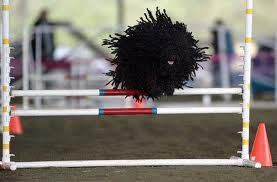
Someone somewhere worked hard to get this dog to look like that.
Inventing an alien sport or game can be tricky. It has to be unique to that world or race, yet relatable to your human readers. It should also have a recognizable element of fun, enough that readers can understand why anyone would do it to relax. Most importantly, use your editing eyes when it comes to description. In my Arcadia series, I made up a game called Castles for my horsemen to play. It makes an appearance half a dozen times over the course of the series and I tried to make it a natural and unobtrusive part of the scene, but in my first draft, I had a detailed explanation of the pieces, board and rules, and wrote out every move complete with score progression. The first game alone took up almost five pages. Fortunately, between the first and final draft, my sister talked me into reading the Harry Potter books and upon reading Rowley’s exhaustive description of Quidditch, I realized what a spectacularly bad idea that would be. Five pages of game play turned into just a few lines and it didn’t hurt the book at all. Hurt me a bit, though. I’d worked hard on that game’s design, but in the end, I just had to come to terms with the fact that no one was ever going to be reading my book because they wanted to learn a new board game. (No one’s reading it to learn how to cure hides either, but I haven’t decided to care about that yet.)
Introducing alien games to humans (either your readers or your other characters) is one thing, but don’t forget it works just as well in reverse. Try looking at familiar activities through non-human eyes and see how you’d react. I love going to the fair myself, but when Daria takes Tagen to the fair in Heat, I knew at once he’d see only safety concerns and suspect food. It was no more dangerous than any fair I’d been to in real life (except for Kane killing people behind the 4-F tent), but through his eyes, every rickety ride and deep-fried candy bar took on ominous overtones.
If I haven’t managed to convince you yet, let me say again that worldbuilding is not about the broad strokes, but rather the fine lines that add detail to an otherwise blurry background. Your characters shouldn’t have a lot of time to kill while waiting for that dragon, zombie or alien invasion—
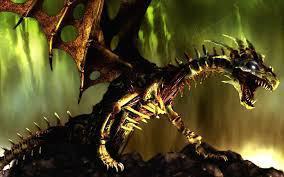
Or an invasion of alien zombie dragons.
—but there will be quiet moments now and then, and even a throwaway remark can add new insight about your non-human character and the place he or she came from. So use them! Old songs and poems are great at delivering expositional legends that might seem too clunky or narrative in dialogue. The violent games of childhood rivals can serve to foreshadow their final battle when they meet again. And the heroine’s knowledge of horticulture may allow her to craft a paralytic toxin at a crucial moment. A collection of unusual human skulls, however, is just creepy (which doesn’t stop the author from having one).


November 16, 2013
Q is for Quintessence
Q is for Quintessence
Why quintessence, you ask? Well, it begins with q and I didn’t think I could spend a whole article talking about quests, quarrels or quandaries. What is quintessence, you ask? (You sure ask a lot of questions.) Quintessence means ‘fifth element,’ which, as we all know, is one of the greatest movies ever made.
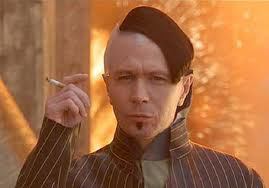
I would have Gary Oldman’s babies and I would even let him wear the tupperware headpiece during the conception.
Quintessence also means ‘the essential element,’ which is not love, as the otherwise excellent movie would have us believe, or at least, it isn’t always love. It’s the single word or phrase that most completely sums something up. A while back, I posted here about the lady at a writer’s convention who lectured us all on the importance of having an overarching theme throughout your books. That would be the quintessence of your writing voice. Likewise, each book should have a core message uniquely its own. Ideally, so should each character, but a cast of dozens of quirky standouts can be overwhelming to the reader, so just make sure your main characters are covered.
“But R Lee!” you cry. “You’ve been telling me all this time to give my characters dimension and depth! Now you’re telling me to make them oversimplified stereotypes? What’s wrong with you?!”
Ah, if I only had a nickel for every time someone’s asked me that…but listen, don’t think of your character’s essence as the start and stopping point of their whole personality. Think of it, oh, as more of a shadow. Even when your hero is in the spotlight at his most intricate and colorful, that shadow is right there, silently influencing all his thoughts and actions.
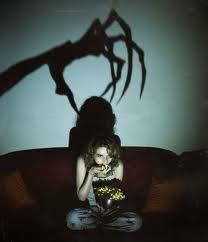
Like this.
My theme as a writer is, as I’ve mentioned, Family. In my Lords of Arcadia series, each book could be summed up as Leaving Home (The Care and Feeding of Griffins), Finding Home (The Wizard in the Woods), Growing Apart (The Roads of Taryn MacTavish) and Coming Together (The Army of Mab). Taryn, for all the many facets of her personality—cheerful, stubborn, maternal, sensual, hot-tempered, compassionate—can also be summed up under one word: Peace. She seeks it, makes it, longs for it, and although she’s not a pacifist in the strictest sense of the word, whenever she has a choice, will always choose the path that seems to lead to peace. I tried not to hit the reader in the face with these things, but at the same time keep it present, like the shadow no one notices that is nevertheless always with you…watching…hungering….
But that’s just one person. Let’s talk briefly about using quintessence as it applies to a group of people. The good folks at TVTropes.com have a beautifully bitchy page devoted to calling bullshit on writers who use one quality to define an entire race and I can’t really blame them. Look at Star Trek. Vulcans are emotionless and logical; Ferengi are greedy; Klingons adhere strictly to their own hyperviolent code of honor. Only human characters are allowed true diversity, with complex dimensions and involved story arcs. But is that really bad writing? When you’ve only got one hour each week to introduce characters, play out some exciting story and come to a satisfying resolution, let me tell you, short cuts have to be made. When you’re writing, unless you want to stop the book for a full backstory every time a new character walks off the page, the same is true. Since I’ve already brought up Arcadia, I’ll bring out some more examples from that series: stoic Farasai, lordly Cerosan, beastial lycan, child-like fauns, tragic sluagh. Of course characters can and should develop as the story progresses—Lily the sluagh is probably the bravest character in the series for all her wretchedness—but whether adhering to their nature or rising above it, their actions should always reflect who they were and who they are.
I mentioned up there that I try not to be too obvious when I’m dealing with a character’s inner nature and I am the first person to admit it can be tricky to represent without looking like you’re representing.
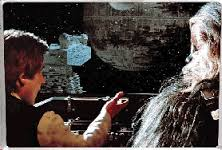
I don’t know…write casual!
In my misspent youth, at yet another writer’s panel, I was once advised by an extremely well-known douche of a writer to write at no more than an eighth-grade level (sixth-grade was even better), re-introduce any information learned more than a chapter ago if it’s pertinent to the present scene, never to have more than nine named characters in any book because the reader won’t be able to keep them all straight, and above all, never try to make the reader think too hard about what they’re reading. I found that insulting then and I find it even more insulting now. Long before I was writing, I was reading and I liked to think about a story, share it, discuss it with others to see what they thought. I think that at our core (our quintessence, if you will), readers are thinkers. I want to write books that make people think, even if all they’re thinking is, “She’s not really going to have sex with that, is she?” I understand that, especially in books as long as mine tend to be, it’s easy to forget the finer details, but I don’t think that characters should just say what they’re feeling all the time and I don’t think that the whole story needs to be rehashed every time a new plot-point is introduced. Subtlety should be a key element to any story and it should not be defined as hitting your reader with a brick instead of the whole wall. Find your Voice, but speak softly. Let your characters’ actions speak for them. Don’t pay more attention to the formula of writing than to the story you’re telling. Respect your readers, but write for you. Write something that makes you think and you will never fail.


November 15, 2013
P is for Politics
P is for Politics
Vorgullum leapt up, walked away, swung around and came back. “Do you think I want to do these things?” he demanded. “Do you think I want these thoughts hammering at my head? Do you think I like the taste of them spitting from my mouth? I am leader! A leader must be hard!” —Olivia
* * *
“I had forgotten how much of politics made up the task of ruling.” Antilles kicked off his hoof-caps and went to the sideboard to pour himself a cup of mead. “I feel that I have wasted the entire day with naught to show for it but scratches of ink.” —The Army of Mab
* * *
Okay, I’m back with my mouth thoroughly washed out with soap and my apology letter written to the very nice NaNaWriMo group who asked me to write only PG-rated material for this project. What can I say except that it’ll probably happen again. I’ve got the letter X slated for a frank discussion of interspecies sex.
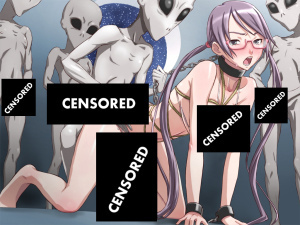
It’s for research, I swear.
But today’s letter is P, so we’re going to talk about politics.
I don’t particularly want to. I have voted in every election since I was eligible and I try to educate myself before I cast my ballot, but I have to admit that if I’m not familiar with the candidates, I tend to just vote for the woman. I don’t believe in voting a straight party ticket and I do believe there are both hateful nutjobs and persons of intelligence and compassion on both sides. I guess what I’m saying is, I’m not a political sciences expert. Before I sat down to research this article, most of my knowledge came from a half-remembered paper I was given in the eighth grade illustrating the various forms of government by using two cows. You know the one I mean? With communism, you slaughter the cows and divide them up equally with everyone else’s slaughtered cows so you all get some (your share is half a hoof); In a democracy, you sell the cows for enough money to buy four calves and go on like that, inflating the sale price a bit at a time, until 1% of the farmers own 99% of the cows; in fascism, a man from the government shoots you, takes your cows and sells the milk to your neighbors. This was how I learned about government.
In a perfect world, most of those models would be effective and efficient (obviously, I’m not including fascism here; that’s why I said ‘most’), but it’s not a perfect world and I don’t think I’m going to shock anyone when I say every form of government is susceptible to corruption. The more corrupt the government, the more prevalent politics become, because at its core, politics is just a little word to encapsulate the fight for power in a system that has authority over people.
So I don’t like politics and I’m hardly qualified to discuss politics, but I do occasionally include politics in my books because it’s impossible not to. Seriously. The first movie I can remembering seeing in a theatre was Disney’s Snow White—a hotbed of political intrigue if ever there was one. The nameless evil queen is the only monarch in evidence by the time the movie properly opens, which means she replaced the first queen (after an untimely death) and then the king (another untimely death) before finally attempting to bump off the only heir. Because she was too pretty and the evil queen was vain? Ha. Snow wasn’t that pretty. What she was, was nearly the age of ascension. But suspicion had finally fallen on old Queeniekins because in spite of a basement full of poisons (I remind you here of the two dead monarchs), she changed up her modis operandi and hired a hitman to do the deed well away from the castle. And notice how we never see the huntsman again? It’s like Game of Thrones with singing dwarves.

Apparently, I’m not the first person to think so.
There are those who say a writer should only write what he or she knows, but I think that would get pretty stale after a dozen books or so. I think it’s important to write outside of what may be familiar, to you and to your readers. For that reason, I tend to steer clear of governments that exactly resemble my own. So let’s have a quick look at the various systems of government I either have used, have seen used or just found interesting.
Anarchy—No organized system of government; People rule themselves
Androcracy—rule by men only
Aristocracy—rule by nobility
Autocracy—in which one individual holds absolute authority (the gullan use this in Olivia; many races use it in Arcadia)
Binarchy/Duarchy—in which two individuals rule jointly (I could go on—triarchy, septarchy, centarchy—but I won’t)
Chirocracy—rule by physical force
Democracy—in which the governing body is elected by the people
Dictatorship—in which one individual who has not been elected rules through force.
Gynarchy—rule by women only (it’s strongly implied the Jotan government in Heat is a gynarchy)
Heterarchy—in which the people are governed by a foreign ruler without representation
Kritarchy—rule by judges or lawyers (God help us if this catches on)
Monarchy—in which authority to rule passes along a family line (used by the Cerosan in Arcadia)
Oligarchy—rule by a special interest; this can be economic, religious, familial or any old interest at all
Panarchy—one government; global or universal rule (the alien governments in both Heat and Cottonwood fall into this category)
Phylarchy—in which one race or tribe has authority over all others
Plutarchy—rule by the wealthy
Republic—in which representatives of the people, elected or appointed, rule jointly for a set term
Stratocracy/Despotism—rule by the military
Theocracy—rule by God or (more often) religious authorities and ecclesiasyical law (I used this system in The Last Hour of Gann)
Totalitarian—rule by a single political party; there may be elections, but all candidates are chosen by the government
Xenoarchy—rule by alien overlords

I read a fanfic along those lines once. It didn’t end well for us humans, but at least the survivors got laid.
Note that you can mix and match systems to create the government that suits you best. America, for example, is a democratic republic (or a democratic republican plutarchy, depending on who you talk to).
Within each type of government (except anarchy, obviously), you have a leader—president, queen, chieftain, governor, empress, to name a few—and his support system—Senate, high council, Parliament, justicars, courtiers, etc. In an alien setting, I think it’s best to use general terms and titles or to make up your own, avoiding words that readers may already associate with a specific culture, such as shogun, tzar or stormtroopers.
Finally, while politics has become synonymous with government, it is by no means exclusive to it. You can find political intrigue and shady power plays in the workplace, at school, in church, even at home. When I was growing up, the front passenger seat of the family car was the prize of whichever child held the top spot in our own secret hierarchy. We all wanted it, but seldom if ever fought over it, because fighting always ran the risk of getting the outing cancelled. But since child-status is determined largely by age, I, squarely in the middle of six children (more or less; my parents fostered and the number varied, but six made up the core group) never got the front seat unless I was going to the doctor and even then, Mom was likely to bring the whole brood along. With six-plus kids, you took your outings where you could get ‘em. Anyway, about the time I was ten, I engineered a deviously underhanded plot to get out of the back of the minivan by entertaining the crispy hell out of anyone around me. I told jokes. I made up little poems and songs. I used my action figures to act out stories. When I was in the car, I was always on, but in the back seat, only my little brother and sisters could hear and see me. It paid off. After a few months of this, as we were about to set off on rather a lengthy drive, just as my older sister Cris was taking ‘her’ seat, Mom said the magic words: “Let R Lee sit up front.” With a justified smirk at my dethroned sibling, I ascended, and there, I am not as ashamed to admit as I should be, I stayed for the next twenty years, until my mother stopped driving.
The moral of this story is, politics are everywhere—especially when it isn’t obvious. It doesn’t even have to be a major plot-point to be effective. Jealousy and misplaced ambition can add interesting dimensions to any character and who doesn’t enjoy the occasional assassination, seduction or betrayal? So go ahead, get your hands dirty. Just remember the difference between politics in real life vs. politics in books: In books, there are always consequences.


November 14, 2013
O is for Obscenity
O is for Obscenity
“I take it summers are shorter on…Jota, right?” she said, with a false lightness he nevertheless appreciated.
“Much,” he replied sourly. “Ninety days. Chok.”
“Well, actually, you know, we’re in the middle of the season, so there’s only about forty or fifty days to go—”
“Chok-se y vok!” he amended, closing his eyes. —Heat
* * *
“Beni mshusho!” Tonka bellowed. “How dare you! In my kraal! To my kinswoman!” —The Wizard in the Woods
* * *
“Serpent of the tree!” spat Kazuul, and slapped her again when she tried to speak. “Obscene stain! Unclean thing!” —The Scholomance
* * *
When I agreed to write this month-long lecture on world-building for NaNoWriMo, I had to promise to keep it PG-rated for the benefit of all those people who don’t like to be surprised by the unexpected appearance of a blue word or naked boob.

Or naked blue boob.
Well, if you happen to be one of those people, I strongly suggest you go watch My Little Pony for a few hours because today’s post is all about swearing and this shit’s about to get real.
Is swearing a valid form of worldbuilding? I think so. Certainly you don’t have to swear in order to write a successful book and you should never swear just because you’ve run out of ways to get your point across (at least your hero shouldn’t; more on that later). But it’s my opinion that if a colorful metaphor is called for and not employed, it can detract somewhat from the tension of the scene. So let’s talk about swearing in a mature and serious manner.
First off, there are essentially two kinds of swear words: profanity, which are words that have a religious base; and perversity, which are words that associate the receiver of the swear with filth. Surprisingly, we all tend to use the same general concepts to swear by, regardless of where or when we were born—parentage, bodily waste, sex, and social slurs—and we’ve done it for thousands of years. Seriously, there’s graffiti on the wall of an Egyptian temple that shows a guy with an erect phallus sprouting out of his shoulders…perhaps the oldest known representation of a dickhead.
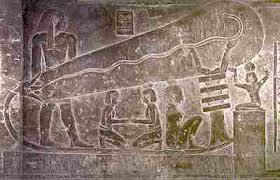
I tried to find a picture of that and couldn’t. Please enjoy this picture of an ancient Egyptian light bulb.
The power and offensiveness of a particular word may come and go over the years, even though the word itself never falls entirely out of fashion. At one time, it was popular to cuss by God’s body parts—God’s wounds, God’s hooks, even God’s bodkin. (Scholars insist bodkin in this context is simply a diminutive of the word ‘body’, and that God’s bodkin means literally ‘God’s dear body!’ and is a very mild oath. To this, I say only that a bodkin was a small dagger or awl and that when the same people referred to Tom’s bodkin instead of God’s, they meant Tom’s tiny dick.) The church responded to all this blasphemy by announcing that, just as the eucharist physically transmuted bread and wine to Christ’s body and blood, calling upon His name in a foul oath physically tore it apart. In other words if Cartwright the carpenter smacked his thumb with a hammer and let a “God’s wounds!” slip, the wounds of the crucifixion opened up and bled on the ascended Christ. No one wants that, so cussing by divine body parts swiftly blurred into more acceptable forms—Swounds! Gadzooks! Odd’s bodkins!—before fading away entirely, supplanted by words that were merely filthy instead of sacrilegious. Lest you smirk too broadly at the quaint euphemisms of the Middle Ages, the practice of using “almost but not quite” swears as stand-ins for the real ones is still around today. Have a look at this short list and see how filthy your mouth really is when you’re not swearing: shoot, sugar, darn, dang, dagnamit, Jiminy Cricket, Judas Priest, Jeepers Creepers, Crikey, cripes, for crying out, for Pete’s sake, shite, feck, blimey, by golly/gosh/gum, tarnation, land sakes, what in the heck/hey/Sam Hill, flipping/freaking, shart, frak…smurf. (That show is filthy. Can you believe some parents let their kids watch it?!)
You’ll notice most of those are the profane sort of minced oath. There’s only a few perverse ones and they’re also more modern. Some—frak, shark, smurf—were invented just to get by the FCC censors so they could cuss on TV shows and audiences would know they were all edgy and stuff. And that’s too bad. In my opinion, the idea that swearing = adult ranks pretty high on the list of all-time worst Bad Ideas, particularly because it ruins what could have been some really good books and movies with relentless vulgarity, and yes, that did just come from someone who dropped the F-bomb 365 times in her last book. And that’s after I took out easily 50 or 60 more.
Here’s the thing. Swearing, like sex, can be absolutely necessary to the book. It can also be painfully gratuitous. The fine line between the two can move quite a bit depending on who’s reading the book (or who’s writing it) and what may seem overboard to one person can be completely justified to someone else. Having said that, if you’re using swear words just to make it clear that your story is for mature eyes only, you’re using it wrong.
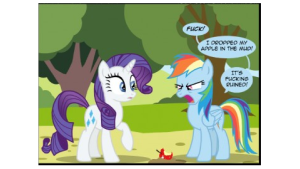
Wrong. Hilarious, but so very wrong.
Profanity should have an impact. It gets less and less shocking the more you hear/read it. If your book reads like a transcript of a Dennis Leary routine, those words lose all their power to shock and your book loses its tension. No one knows better than I that swear words add a nice ‘flow’ in certain sentences, but sentences add up and pretty soon you’ve got a page and a half of pejoratives, which never has a nice flow and I don’t care how well each individual sentence reads.
One of the biggest arguments I personally hear from writers who have been criticized for excessive swearing is that their books reflect reality and in the real world, people swear, damn it! This is true, of course. My extremely casual research came up with the statistic that swearing makes up 0.7% of the average person’s speech on any given day. Sounds about right. On the other hand, if I wrote verbatim some of the things I myself say, it would read like a bad 90s teen movie: “I was like, Dude, what the actual fuck? And he was all, what’d I do? And I was, Man, you know what you did, you cheese-eating bafflenut! And he was all whatever so I just came home.” I have to admit I talk like that, but I don’t write like that, at least not in large doses, because it makes me sound like an idiot. That’s what reality sounds like. And when you replace 0.7% of your book with swear words, you sound like a lazy, angry idiot. So use an editing eye.
It’s important also to remember when writing in a fantasy or sci-fi setting that swear words are representing your fantasy or alien race. I said earlier that, here on Earth, we all swear by the same general concepts and it’s reasonable to assume non-humans would as well, but even within those basic precepts, there exists a wondrous variety. For example, throwing doubt on someone’s parentage is a time-honored tradition in swearing, from the all-purpose “You bastard!” to the singular “Your mother was a hamster and your father smelled of elderberries!” But different cultures have their own ideas of what an offensive parentage entails; in some parts of the world, “Son of a turtle” is more insulting than “Son of a whore” even though they’re both ways of saying the son in question never knew his father. Unique little twists like that give a fictional world depth and interest while remaining relatable to the reader.
What makes a word dirty? After all, everybody poops and yet we all recognize “Shit” is something we can’t say on TV, at a fancy restaurant or around the neighbor’s kids. Heck, even apes taught to sign swear by shit and they fling it around like they were pooping Frisbees (and no one taught them that either. Teach an ape to sign and it will start to swear all on its own; the first swear is almost always ‘dirty,’ ie ‘shitty’).
Ironically, “shit” isn’t a swear word, or at least it wasn’t always. It’s an old Saxon word that meant poop and was about as offensive, which, in the days before private toilets, was not at all offensive. After the Normans conquered the Saxons, they started using the losing side’s words in especially derogatory situations—Farmer Francis taking a stool after some bad stew evoked only casual sympathy; Farmer Francis taking a shit brought on howls of scornful laughter. I know, I know. Medieval humor. You kind of had to be there.
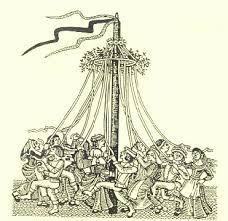
Case in point: A medieval rave.
My point is, swear words get their sting from being derived from something dirty or shameful, but what’s considered dirty or shameful varies from place to place. For you, the writer, this means being especially conscious of what would be an insult and what wouldn’t in the context of your specific world/race, remembering as you do so that shame is at the root of every perverse swear word. In ancient Rome, for example, there was no fully developed concept of being hetero- or homosexual, but there was a tremendous stigma attached to being thought the passive rather than the active partner. So despite what you may see on shows like Spartacus, saying something like, “Justicus used Brutus like a woman,” was no insult at all to Justicus (and may even be a compliment, depending on how big or scary Brutus was), but you could be killed if word got back to Brutus. Likewise, attacking a man’s virility or bravery was a far better way of getting your ass kicked than questioning his parentage. After all, a man had no control over who his father may have been, but reputation was practically the coin of the realm.
Finally, keep swearing appropriate to the place, time and, above all, person. In my relatively short time writing, I have already learned that readers have certain expectations when it comes to heroes and heroines and when a writer fails to develop those characters along those expectations, sales will reflect their disapproval. One of the biggest ways you can make your hero or heroine unlikeable is by making them an unrelenting pottymouth. A well-timed and well-deserved “Fuck you and the crippled baboon that gave you birth,” is one thing, but cussing every other word demonstrates an inability to cope with unpleasantness and a lack of self-control. And these are qualities that your hero simply cannot have.
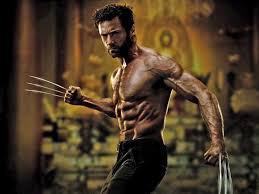
To every rule, an exception.
This doesn’t mean your hero can never swear. It just means that your hero’s reaction to every bit of bad news can’t be a four-letter word, nor should he swear casually, as in, “This fucking turkey is delicious, hon. Best god-damn stuffing I’ve ever had in my fucking mouth.” (You want to hear something hilarious, though? You can give the exact same habits to a side-character whom you meant to be unlikeable and watch him turn into a fan favorite.) I was once told that every word you write should fight for its right to appear in your book; it’s true, it’s doubly true for expletives and it’s ten times true for expletives coming out of your hero’s mouth.
If you’re interested in the origins of your favorite foul words or want to learn some new ones, read Melissa Mohr’s Holy Sh*t: A Brief History of Swearing, Wicked Words by Hugh Rawson, and How To Swear Around the World by Jason Sacher. Online, check out insults.net or youswear.com to improve your international vocabulary. And if anyone tries to tell you fuck originated as an acronym, you tell them for me they’re full of shite.


November 13, 2013
N is for Names
N is for Names
Antilles lifted his son from her arms and held the heat of that small body against his heart. His son. His perfect son. He listened and heard the name singing in his soul, the name that made his own, his father’s, and every name since the Beginning Time complete and whole. He said, “Behold, thee has given me Eudorus, my firstborn, and heir to all my legacy.”
“Eudorus,” she said.
“Aye.” Antilles nuzzled at the new-named and felt his nose punched. “But thee shall give him the name by which others shall know him, if thee should so desire.”
She smiled, reaching up to touch him, to touch them both. “Lugh,” she said.
An Earth-name. He tested it, found it strong and right, and nodded. —The Army of Mab
* * *
When I was in the fourth grade, my Language Arts teacher was Mrs. Dyson-Bunsen, or Mizz DeeBee for short. If you don’t know, Language Arts was kind of like kiddie-English, consisting of spelling and vocabulary quizzes, a textbook of “age-appropriate” literature with questions after every chapter, and the ever-present threat of book reports. Mizz DeeBee did all this, but also incorporated a curriculum on creative writing that lasted the entire school year. It’s no exaggeration to say I might not be writing today if not for her work then (so direct hate-mail accordingly).
As part of her lesson plan, Mizz DeeBee spent an entire month talking about names. I know, right? An entire month talking about just one thing? Who does that?

Oh.
She covered everything: choosing a contemporary name based on the character’s personality, taking names from nature, forming compound names or fantasy names, taking names from numerology or astrology, using foreign variations or mixing up letters for truly unique names. Every single day, a different perspective on names.
Well, I’m not going to do that. I can’t possibly improve on Mizz DeeBee’s lessons, so rather than fall short, let’s talk instead about some different kinds of naming customs in worldbuilding.
True names. I’m sure you don’t need me to tell you that names often carry an innate power in fantasy settings (but I’m going to anyway). It’s a trope I’ve used myself. In my Arcadia series, casual names are used by virtually everyone lest their true names should fall into the wrong hands (ears?) and be used against them. In Olivia, the power of a person’s name was so great, it was taboo to speak it after that person’s death, for fear of calling them back as a vengeful spirit. These are both concepts found in numerous cultures throughout history right up to the present. At its core, this idea typifies the belief that a name is somehow bound to a person’s true essence. Knowledge of the name is therefore an intimate knowledge that can either bestow tremendous inner strength or do devastating harm.
‘Companion’ names. A variation of the true name but without the supernatural influence, this is a special name used only among family or close friends. I can think of no better illustration than Tolkien’s Aragorn…also known as Strider, also known as Elessar Telcontar, Envinyatar, Estel, Thorongil and Elfstone.

Also known as Ranger McYummypants.
Heritage names. These are names derived in whole or in part from the name of another family member, usually an elder or ancestor. In certain cultures where spirits are thought to reincarnate within the family line, it is the custom to name a newborn after the last family member to die to honor the deceased’s return. In other cultures, the first girl born takes her mother’s maiden name as a first name to honor the maternal line. Heritage names can certainly be confusing when you get a large number of people honoring the same relative (there are over two dozen Micheals between my father, brother, cousins, uncles and nephews), but they can be simplified. I know of several people who gave their children names that all began with the same letter—In my Arcadia books, I had the former lord of the Valley name his sons this way, giving the all names that began with A. Shared suffixes or prefixes isn’t very common now, but it used to be a popular way of demonstrating a familial connection, particularly before the use of surnames—I used this technique in Heat, when Uraktus names his son Kanetus.
Multiple names. Here I’m talking about more than just using a surname or middle name. I mean those cultures that pile on names like a kid piles toppings on his first make-your-own-sundae bar. In ancient Rome, for example, a man would have his given name, his clan name and another name referring to a characteristic like his family occupation or social status, but additionally he might have several names in honor of various noteworthy ancestors or a variety of names drawn from any remarkable accomplishments. In European royal families, one’s titles and holdings can be considered part of one’s name. How long does that translate to? Well, rumor has it that if the Queen of England is ever late to a function, the person announcing her can just recite her titles until she arrives.
Destiny names. My baby name books are simply filled with order of birth names, day of the week names and ‘circumstance’ names like Abiona (born during a journey) or Ige (born feet-first). In India, it is a common practice to invite divine favor by naming a baby after a god or goddess; many of us in the West have names shared by saints, angels and other religious figures as well. Puritans had notoriously lofty ideas when naming their offspring; in addition to virtue names like Chastity and Temperance, you can find such folks as Job-raked-out-the-ashes, Search-the-scriptures, and my personal favorite, Damned-is-he-who-knows-not-the-Lord. Of course, sometimes it’s not about invoking fate as much as evading it. In certain tribes following a difficult birth, a child may be given a name that literally means, “Worthless one,” so that the evil spirits will move on in search of a better-loved baby to torment.
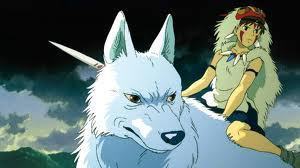
Because who wants to grow up in the forest with wolves and magic and stuff?
Now that you know what to name your characters, you might want to think about when and how. Here on Earth, names still have a way of being tied to the concept of a soul. In some places, a sickly infant won’t be named at all, so that if it dies, it can come back again; the soul is only ‘bound’ to the individual when named. In direct contrast, other weak infants are quickly given names, which can then be used to set their soul at rest when they die so they don’t turn into vengeful wraiths. Even today, many Christian parents ‘seal’ a baby’s name with a christening, a ritual that claims the child on behalf of their faith and grants it divine protection.
Some final words of advice: Whatever you do, treat your world’s naming rituals with respect. Names should never be silly or crude if you want the character to be taken seriously. Think twice before giving a character a ‘badass’ name like Beretta or Wolf; there’s a fine line between cool and campy. Do try to give your non-human names a consistent sound, but don’t overuse letters. And lastly, avoid names that are impossible to pronounce, especially for main characters. Your aliens may be able to say Jl’xxf’nar perfectly through their triple tubular mouth orifices, but your human readers are only going to struggle with it for so long before they set the book on fire and mail the ashes to your house.


November 12, 2013
M is for Marriage
M is for Marriage
“We are blessed, who prove fortunate enough to find love in this life, for the gods give us all hearts but no promise of what passion may warm them. Yet here are two.” Tonka smiled slightly, his gaze moving from one to the other of them. “Two hearts and one soul, and I can offer them no greater blessing than the love they have found for themselves… My lord, you have named this lady for your wife, but you wed her in Rucombe, and here in my kraal, we do not enter such bonds lightly. This is my own kinswoman and well-favored does her chieftain find her. Speak your oath to me ‘ere I give her.” —The Roads of Taryn MacTavish
* * *
Amber walked a little faster. “You didn’t even ask me if I wanted to marry you.”
“Why would I do that?” Meoraq asked, amused. He didn’t have any trouble keeping pace at her side.
“Because you can’t marry someone against their will!”
“Yes, I can.” —The Last Hour of Gann
* * *
Marriage, like death and religion, is one of those things that can vary so wildly from culture to culture and era to era that I research it even when I’m not writing. Plus, if you’re reading this because you write romances like I apparently do, a marriage has got a better than average chance of finding its way into your book. Most of the articles I’ve written thus far feature subjects that work best in the background, but weddings are meant to be splashy affairs, so here you finally have a chance to worldbuild right in the reader’s face.
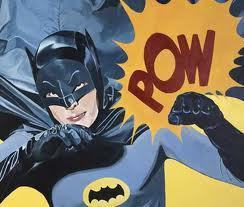
Worldbuilding!
You probably think this is going to be another of those articles where I spit the internet at you until we both leave in tears. Well, you’re right. Seriously, you should play the lottery. Anyhoo, in the most simplistic sense, there are two camps when it comes to marriage: The couple can choose one another and marry for love or someone else can arrange the marriage without the involvement of one or both parties.
Love-matches are more common today in more countries than ever before, but don’t get the idea that they’re a recent development. The custom of choosing one’s own mate has enjoyed steady waves of popularity that probably go all the way back to the caves. However, it is a luxury in most cultures. Oddly, it’s one of the few luxuries mostly enjoyed by the poor. After all, if Gilly the goose-girl, decides to marry Matthew the miller’s son instead of Butcherstab the blacksmith, nobody gets hurt. Almost nobody.
But if Princess Penelope wants to marry Sam the stable boy, that’s too damn bad. When you don’t have money, land or political power, you have a surprising amount of personal freedom; when you do, marriage is just another tool to protect what you have or acquire more. Hence the recurring theme of a poor person marrying well above his or station is just as much a fairy tale for the prince or princess—the poor person escapes from poverty and worse (if a girl, she is invariably also mistreated by family and serving as a drudge; if a boy, he is usually a vagrant or thief, frequently threatened with imprisonment or death), but the rich person gets to marry for love.
In my Arcadia series, the Cerosan lords rarely marry at all, but instead take a lifelong consort to aid him in his rule and a number of concubines whenever his fancy flits that way. Any children would be considered legitimate and since succession does not depend on birth order, any one of them could become the lord’s heir. When Antilles sends word to his relatives to return and that he’s getting married, they arrive with his childhood sweetheart in tow as the likeliest prospect. And she doesn’t seem put off in the slightest to think he proposed by way of a lordly decree that didn’t even mention her by name! Nobility just does things differently.
Then again, we have a tendency as human beings to set the standard of what is normal by what we do and see every day, sometimes without considering the origins of the symbols we so freely use. Therefore, a ‘normal’ wedding to most of us is presided over by an authority figure—most often a priest, otherwise a judge, a justice of the peace, or Elvis. The bride wears white, symbolizing innocence and virginity, and is escorted to her husband by her father, taken (as property) from one household to another. The ceremony consists of vows—traditionally the husband vows to honor and cherish, the wife to honor and obey—and ends with the raising of the bridal veil and a kiss. Other themes common to this type of wedding is an exchange of rings (seen in various cultures as a symbol of eternal love or union or ownership), an elaborate cake (prosperity), flowers (fertility), and throwing rice as the couple leaves (a double-whammy, fertility and prosperity both).
The use of symbolism in a formal ritual is a vital element both in worldbuilding and in storytelling, and it’s one of the few times you can really go big and it will still seem normal in the context of a wedding. I tattooed Taryn’s arms and face with blue dye and put Antilles in a toga and have yet to hear one WTF were you thinking? And honestly, it doesn’t matter what you think up, you’re not likely to write something weirder than we already do right here on Earth.
In some parts of the world, the bride is chased from her family’s home with switches; in others, she’s paraded through the streets surrounded by dancers and musicians. Preparing the bride to meet her groom could be an elaborate process all by itself. Some of you may have already heard that old chestnut about how Spartan women had to be shaved and dressed like boys for their prospective husbands to be attracted enough to formally kidnap and marry them. I think it’s worth pointing out that the Spartans never mention this (I admit they were notoriously bad at record-keeping). These stories come from other Greek states where women were kept on a far shorter leash and where whole armies didn’t stand a chance against one Spartan phalanx, so their veracity is suspect to say the least, but it does paint a strong picture and isn’t that what worldbuilding is about?

Never let the facts get in the way of a good story.
Across the globe and throughout history, a friendly kidnapping is often part of the wedding rituals (so are real kidnappings, although I consider those less a marriage and more a criminal assault). The groom is often the aggressor, although some traditions add the twist of the bride’s family kidnapping her back while the groom celebrates his wedding. Interestingly (at least to me), is the fact that although the bride seems passive, the custom is usually associated with love-matches, so it can be safely presumed she’s a willing participant.
When it comes to arranged marriages, one common custom is the paying of a dowry or bride-price. These negotiations may not be a strictly financial transaction either, but may also include feats of manhood or other ordeals meant to prove the groom’s ability to protect and provide for his bride. I borrowed some of this philosophy for the gullan in my book, Olivia, and again for the lycan in my Arcadian series; in both books, the suitor had to prove himself a hunter and make a public declaration of his fitness when petitioning for a mate and it was understood that a stronger challenger could always take her from him.
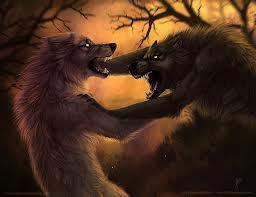
This is what’s known as a ‘werewolf divorce’.
You know, it occurs to me as I write this that while I’ve had several weddings in my books, I’ve never really had a proposal. The closest I get is with Antilles, whose effort is so oblique Taryn sleepily laughs it off. The gullan abduct all their human mates, although in fairness to them, they weren’t in a position to propose. In The Last Hour of Gann, the idea of asking a woman before marrying her is absurd to Meoraq; when he acts as an officiator at one point, he doesn’t even ask the men. I guess subconsciously I must not think proposing is important. Sometimes I can’t believe people think I write romances.


November 11, 2013
L is for Language
L is for Language
“Your lesson,” he growled. “Tiyavek sa sen channan.”
She had to say it twice before he was satisfied. “What does it mean?” she asked.
“Teach me,” he said, nipping at her throat. “Teach me my lessons.” —Heat
* * *
The door yanked itself open inwards, and there he was—the alien. Seven feet, dark brown with black streaks, snapping mouth palps, twitching antennae, and dull red eyes, glaring at her. He spat out a curt series of grumbles and clicks. “Fuck off,” said an electronic voice in her ear. He slammed the door. —Cottonwood
* * *
Many years ago, when I was still writing the book that would become Olivia, I attended a writer’s panel at a sci-fi convention. The subject was worldbuilding. It was hosted by no-doubt impressive sci-fi authors whose names I no longer remember, although I do remember none of them looked like they particularly wanted to be there. When the issue of language came up, the entire panel took several minutes to make fun of the various books, movies and TV shows who use English-speaking aliens and then, without missing a beat, started making fun of the various books, movies and TV shows that created a fictional language. “Unless you’re a physicist,” one of them concluded, “you should never try to introduce and explain alien technology. And unless you’re a linguist, you should never make up a language.”
Well, with all due respect to that esteemed bunch of boy-bitches, they’re wrong. Language is right up there next to physical appearance when it comes to setting aliens and humans apart. I believe strongly that non-humans should have their own language and they should revert to it in moments of passion. Should they have separate names for every rock and tree and sit around singing to each other in dialects incomprehensible to the reader, using fonts full of extra dots and squiggles and generally making a nuisance out of the otherwise enjoyable past-time of reading?
No, of course not. A little alien goes a long way, but too much alien is worse than none at all, even when you are a master linguist and a master storyteller like Tolkien. The trick lies in using language minimally, appropriately, and above all, realistically. Now, I’m not suggesting you take up linguistics, because if you’ve got ten years to devote to a hobby, it ought to be writing your book, not researching it, but do keep track of the words you use and how so that you remain consistent in your speech patterns. And while I realize that many non-romantic-root languages don’t follow this next tip, for the sake of your readers, make words that are related look related so that meanings are easily grasped even if you don’t stop immediately to translate.

“Can’t I please just take the linguistics course?”
I have a tendency to overthink things, which I’m sure will come as a shock to exactly nobody, but I like to think I’ve lightened up a bit over the years. When I wrote Olivia, freshly-chastened by that so-helpful sci-fi panel, I was afraid to use language, so very little gullanese appears in the final product beyond names. But in Heat, oh boy. Confidence bolstered by my total lack of sales on Olivia, I whipped up a Jotan vocabulary of something like a thousand words, complete with morphology showing past, present and future tense, common suffixes and sentence structure. I went on to pepper nearly every chapter with alien words and phrases, offering no translation whatsoever for the vast majority of them, and just sort of hoping the reader would ‘get it’.
I think for the most part I was successful. At least I’ve never had anyone come to my house and whallop me in the face with a copy of the book. Although I didn’t consciously know it at the time, I had subconsciously glommed onto the writer’s secret that certain sounds set certain moods. Jotan swear words are short and hard. When they get amorous, the words are hums and throaty growls. Looking over the book today, I know I used too many alien words, but I don’t think it’s too tough to figure out what they’re saying.
By the time I was working on Cottonwood, I believe I had reached that happy medium between too much and not enough. My list of yang’ti words is only two pages long (and I still used less than half of them). I allowed for a ‘magical’ translator for ease of communication and let the alien words fall naturally where they wanted to go. The result is, I think, much more otherly than the gullanese of Olivia and much friendlier to the eye than the Jotan in Heat. So if there’s a lesson to be learned from my experiences, it’s to treat alien words like toilet paper: use less and use it efficiently.

And don’t be afraid to have fun with it!
Okay, so now that we all feel comfortable making up languages, where do we find the words? I’m fortunate in that speaking gibberish comes naturally to me—practically no one understands me as it is—so as usual, I’m full of good advice. First, think about the kind of sound you want your language to have. Do you want a harsh, aggressive sound? Use more fricatives—hard consonants and glottal stops. How about an ethereal sound to go with your wispy air elementals? Use sonorants—lots of vowels and trills. Readers have an expectation that insectoid races will speak in insectile sounds—lots of clicks, taps and rattles with plenty of hard consonants in-between. Similarly, what reptilian race isn’t portrayed dripping sibilants and dipthongs from a flicking, forked tongue?
If you find yourself struggling to come up with enough words or if, like me, you suddenly notice that most of them begin or end with the same letter, there are a ton of alien word generators online that you can turn to in a pinch. I’ve tried out a few and find spacecorsair to be the most user-friendly. It has a number of pre-programmed templates (they’re all named, although I’m not nerd enough to recognize their origins, but you can pick up on their sound with a few samples), which can generate short lists of words or even sentences, but this one allows for customization, for a more unique sound. I’ve used Seventhsanctum in the past, but despite the initial impression of variety, so much of what they present is meant ‘ironically’ that it can be difficult to wring something useful out of them. Just beware of relying on any generator too heavily; they’re only programs and too much can leave your language sounding unusable and artificial. Unless that’s what you’re going for, go it alone as much as you can.
So now you have a fully-developed fake language and you’re ready for your alien to start quoting Shakespeare. Unfortunately, this only highlights your next problem: the language barrier. As I said at the start of this article, or at least close to the start…or at least closer than I am now, I believe alien languages should be used realistically. For me, realism means always acknowledging the language barrier. Yes, it’s a pain in the ass to stop the story and get everyone speaking the same language, but at least that’s a temporary stop. When I read a First Contact scenario where the alien speaks perfect English, I close that sucker and never open it again. The only people in my opinion who ought to get away with universal translators are Gene Roddenberry and Douglas Adams. Everyone else needs to admit the very notion is right up there with fairy magic and find another way around the problem.
“But R. Lee!” you cry. “You used a universal translator in Cottonwood!” The hell I did. I used a device that took years of development and only serves to translate the alien yang’ti into one of a set number of Earth languages, in Sarah’s case, English. I’ll be waiting for your written apology, but in the meantime, without a babel fish, how do we proceed?
Before he went balls-out cash-crazy, George Lucas made a pretty good movie called American Graffiti. Then he made a better one called Star Wars. Star Wars handled the language barrier by having some characters act as interpreters for others. Occasionally, aliens spoke one another’s language; more often, they understood one another, but lacked the physical ability to vocalize alien speech correctly.
But say you don’t have a protocol droid handy. How much time can you expect to waste teaching your alien to talk? Short answer: A lot. With full immersion and effort on both sides, it’s still two months before the average person can be conversant in a foreign language.

Source.
And if you don’t have two months to sit around signing at each other and talking like Tarzan? Well, I watched three days of Spanish television recently and I know a few more words than I used to. I think if I’d had two weeks, I could have elevated my level of communication from WTF to merely Confusing.
Still not good enough? Then hell, I give up. Use the babel fish. Se tasleal ema die.


November 10, 2013
K is for Kinship
K is for Kinship
They were somewhat related, Nkosa’s mother having been a servant in a house where Meoraq’s father had once stayed on a circuit. She claimed him for the sire, and even though she carried no scars to prove it, when the baby opened up male, Rasozul had paid for the boy’s placement at a training hall (or whatever passed for one in a city like Tothax). Of course, the woman had been swiftly married to one of her own caste, the man whose name Nkosa carried. Meoraq had known nothing of this until their first meeting, when Nkosa rather shyly asked if he was by chance related to Rasozul and the whole story had come out. Meoraq had seen no reason to query his father for confirmation. The Uyanes were Sheulek all the way back to the founding of the House; it was inevitable that he should find blood-kin. Really, it was a wonder he didn’t find more of them.—The Last Hour of Gann
* * *
Arion walked nonchalantly up two rows of openly-staring horsemen and stood before the high table. “Hail, chieftain,” he said cheerfully. “Ho, Rhiannon. Where shall I stand?”
Tonka put his cup down. “You overstep yourself, traveler.”
And two hundred Farasai pulled spears.
But Arion very calmly helped himself to a trencher and pulled the Cerosan-sized chair made for Antilles over to the table. “I think not,” he said, sitting in it. “Hear my reasoning. Lady Taryn is thy named kin. Also, she is now married to my brother, who must, by point of that fact, also be kin. And as any kin of his must therefore be kin of yours, my feelings have been sore abused at being left to a traveler’s hospitalities. But no longer. I have decided to forgive you this oversight and come to share a kinsman’s meal.” —The Roads of Taryn MacTavish
* * *
Faithful followers of this blog may already know that my parents fostered dozens of children for over thirty years. I may have been as old as ten before I even realized that the situation was an unusual one. Until then, I just sort of assumed that someday, I too would have to pack up a suitcase and go live with another family for a few days or months or years—a prospect I awaited with due sense of excitement and trepidation. Unknowingly enforcing this idea, my grandparents housed foreign exchange students for the nearby university. Every year, when we went to visit, a different “big kid” was living in their basement. Their last, the only one I remember well, was a talking stereotype of a Japanese schoolgirl. She was small and pretty and ridiculously cheerful, wore a uniform, giggled all the time and was wicked good at origami. All she needed was super-powers and/or an inappropriate relationship with a tentacle-beast and she could have had her own cartoon show.

Or her own soft drink.
I loved her. While the grown-ups were talking, I used to sit on the floor with her and tell stories while she folded paper. She spoke very little English. I spoke no Japanese. We had no trouble communicating that I recall. For the little time we had, we were family.
I told you that story to tell you this story: At a romance writer’s convention this past year, I attended a panel in which the hosts—all three very successful published authors as opposed to the roomful of indie poseurs they addressed—informed us that in order to establish a true author’s Voice, we had to write books along an overarching Theme. “What are your books about?” they asked. “What are you saying?”
‘I’m saying Buy my books,’ I thought, rather uncharitably, but then I thought about it and the more I thought about it, the more I realized I actually did have an overarching Theme in each of my books and it was Family.
Gosh, that annoyed me. Yeah, on the one hand, it was cool that I actually used a real authorial tool (without even noticing!), but I work hard to make all my worlds distinct from one another and I didn’t particularly want all my different races to have the same attitude about anything, much less my attitude. But okay, since I’ve already broadcast my feelings across nine books, I’ll go ahead and clarify my position in five words: Blood is thicker than water.
That’s an old, old saying and many of you might think it means the blood of your bloodline being a stronger bond than pretty much everything else. In fact, the blood of the original idiom referred to the blood spilled in battle, the trials endured together and victories achieved together, while the water referenced birthing waters. In short, being born to this or that person was dumb luck; your true brothers were the people you’d take into battle.

A heart-warming film about family.
In Heat, I made my feelings about as clear as they could be by creating a world in which fostering was the norm. Because conception is so painful to the Jotan race, females are drafted to breed in a kind of sexy lottery. The children are packed off to institutions and adopted. My hero, Tagen Pahnee, never thinks about his biological parents—they are a complete non-issue to him—but feels a tremendous amount of pressure to live up to his adopted father’s family name. And would my villain, Kane, have grown up to be the same (delightfully) horrible person if he had not been raised by Uraktus E’Var? In Heat, it is nurture, not nature, that makes a family, which is what I firmly believe in real life.
However, as my sister so often reminds me, my opinion is not the only one (just the only valid one) and so, let’s talk about some different perspectives on what it means to be kin. I can’t possibly cover every variation that ever existed, so of course this list is going to be a short one, but I do hope you find the entries as interesting as I do.
In my opinion (see preceding paragraph), there is no better way to start this article (you can still start after 1000 words, right?) than with the monogamous nuclear family, consisting of two spouses, their children and occasionally some grandparents. I want to start with this model because I believe it’s familiar to most of us and also because it’s boring and I want to get it out of the way.
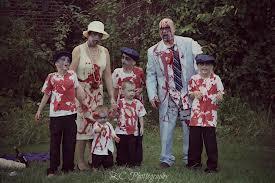
Well…most of them are boring.
I should point out here that even in this, the staunchest oak of family trees, there can be a few interesting knots and gnarls. History has shown us that household authority can be patriarchal (man in charge) or matriarchal (woman in charge). Inheritance can also be patrilineal or matrilineal. In a few cases, there were patriarchal households with matrilineal inheritance laws—the husband had ultimate authority and could even kill his wife or children without retribution, but he could not inherit from his wife’s estate.
One could further branch out the concept of family on your world by factoring in a cultural acceptance of polygyny (having more than one wife), polyandry (having more than one husband) or just plain polygamy (a little of this, a little of that), or prune it back with consangueous marriages, for example, marrying one’s deceased brother’s wife—a practice which was once the mandatory duty of a surviving sibling, but in another time and place decried as incest. And what about incest? Many cultures have used it at one time or another to keep royal bloodlines pure, even while executing common saps for practicing it themselves. A thing of the past, you say? And yet it wasn’t too long ago at all that an unscrupulous fellow could adopt a wealthy young bud as his ward and then marry her when she blossomed. Not technically incest, maybe…but quite often he knew about that wealthy young thing because she was a shoot on the same family tree.
Branching out a bit more, we have the extended families, which begins with the same root group of grandparents, parents and children, but includes uncles, aunts, grand-uncles and –aunts, and as many degrees of cousin as you can count. The further back in history we go, the more we see this type being practiced when the family has something to lose—a throne, for example, or social status or cultural identity. The more extensive the family tree, the more relationships within the group tend to form their own hierarchies. Most of us can get behind the whole “respect-your-elders” thing—

Some of them get more respect than others.
—but imagine for a second having to live in the Chinese kinship structure, with seventeen separate determinants for who to respect and how. Or in a Australian Aboriginal moiety, which can acknowledge sixteen distinct skin groups, which in turn determines who you marry and who your kids will marry. At the opposite end of the complication spectrum (or maybe just so far beyond it that it only seems that way), consider traditional Hawaiian families, which are very extensive, yet lump members into categories based mainly on gender and generation—you would refer to all the women of your mother’s generation as “Mother” and all the children of your own generation as “Brother” or “Sister”.
There is so much more I’d love to touch on—ancestor worship, ghost marriages, generational reincarnation, concubines, blood feuds, adoption rituals, divorce through the ages—but rather than plant more ideas, I think instead I’d like to trim it down and leaf you with a snippet from Cottonwood that sums up my feelings on family perfectly:
I am you and you are me.
(And yeah, somewhere along the way, I started doing tree puns and instead of stopping once I realized, I just went with it. I know, I know. I’m a beech.)





